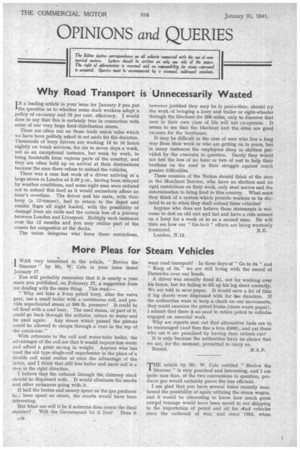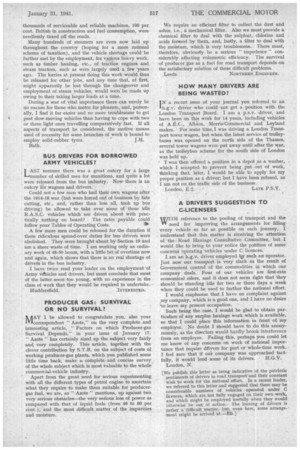More Pleas for Steam Vehicles
Page 28

Page 31

If you've noticed an error in this article please click here to report it so we can fix it.
I WAS very interested in the article, "Revive the
Steamer" by MK. Mr: -Cole in your issue dated • , January 17.
a You will probably remember that it is nearly a year since you published, on February 27, a suggestion from me dealing with the same thing. This read:— " Why not take a 3-ton petrol lorry, alter the valve gear, use a small boiler with a continuous coil, and provide superheated steam at 300 lb. pressure? It could be oil fired with a coal base. The used steam, or part of it, could go back through the radiator, return to water and be used again. Any steam which passed the pistons could be allowed to escape through a vent in the top of the crankcase."
With reference to the coil and water-tube boiler, the advantages of the coil are that it would require' less water and afford a great saving in weight. . Anyone who has used the old type single-coil superheater in the place of a double coil must realize at once the advantage of the latter, and I think that still less boiler and more coil is a step in the right direction.
I believe that the exhaust through the_ chimney stack should be dispensed with. It would eliminate the smoke and other nuisances going with it.
If half the brains and money spent on the gas producer been spent on steam, the results would have been interesting.
Blit What use will it be if someone does create the ideal steamer? Will the Government let it live? Does it A26 want road transport? In these days of" Go to its "and " Keep at its," we are still living with the sword of Damocles over our heads.
A driver was recently fined £1, not for working over his hours, but for failing to fill up hislog sheet correctly. We are told to save paper. It would save a lot of time if log sheets were dispensed with for the duration. If the authorities want to keep a check on our movements, they could examine the petrol -forms (more waste paper). I submit that there is no need to ration petrol to vehicles
engaged on essential work. • Why are reports sent out that alternative fuels are to be encouraged (and then fine a firin £500), and yet those who use it are penalized by having their rations cut?
• It is only because the authorities have no choice that we are, for the moment, permitted to carry on.
Bristol. R . A . P.
THE article by Mr. W. Cole entitled "Revive the Steamer" is very practical and interesting, and I am quite sure that, of the two conversions in question, producer gas would certainly prove the less efficient.
I am glad that you have several times recently men' tioned the possibility of again utilizing the steam wagon, and it would be interesting to know how much gross annval tonnage would have been saved to our shipping in the importation of petrol and oil for itad vehicles since the outbreak of war, and since 1934, when thousands of serviceable and reliable machines, 100 per, cent. British in construction and fuel consumption, wereneedlessly taxed off the roads.
Many hundreds of steamers are even now laid up throughout the country (hoping for a mote rational scheme of taxation), and the vehicle shortage could-be further met by the employment, for various heavy work, such as timber hauling, etc., of traction engines and steam tractors, such as were largely used a few years ago. The lorries at present doing this work would thus be released for other jobs, and any time that, at first, might apparently be lost through the changeover and employment of steam vehicles, would soon' be made up owing to their taking larger loads at a time.
During a war of vital importance there can surely be no excuse for those who motor for pleasure, and, personally, I find it far easier and no more troublesome to get past Slow-moving vehicles than having to cope with two or three light ones travelling comparatively fast. If all aspects of transport be considered, the motive means used of necessity for some branches of work is bound to employ solid-rubber tyres.
Bath.
• BUS DRIVERS FOR BORROWED ARMY VEHICLES?
LAST , LAST summer there was a great outcry for _a. large LAST
of skilled men for munitions, and quite a lot were released from the bus industry. Now there is an outcry for wagons and drivers.
Could not a few men who had their own wagons after the 1914-18 war (but were forced out of business by late cutting, etc., and, rather than lose all, took up bus driving) be allowed to take over some of these idle R.A.S.C. vehicles which are driven about with practically . nothing on board? The rates payable could follow your Tables of Operating Costs.
A few more men could be released for the duration if these ridiculous spread-over duties for bus drivers were abolished. They were brought about by Section 19 and are a sheer waste of time. I am working only an ordinary week of 48-50 hours, with a little bit of overtime now and again, which shows that there is no real shortage of drivers in the bus industry.
I have twice read your leader on the employment of Army veghicles and drivers, but must conclude that most of the latter seem too young, with no experience in the class of work that they would be required to undertake.
Huddersfield. INTERESTED.
PRODUCER GAS: SURVIVAL OR NO .SURVIVAL?
imAY I be allowed to congratulate you, also your "correspondent " Azote," on the very complete and interesting article, " Factors on which Producer-gas Survival Depends," in your issue of January 17. " Azote " has certainly sized up the subject very fairly and very completely. This article, together with the clever contribution by S.T.R. on the subject of costs of working producer-gas plants, which you published some little time back, make acomplete and concise survey of the whole subject which is most valuable to the whole commercial-vehicle industry.
Apart from the great need for serious experimenting with all the different types of petrol engine to ascertain what they require to make them suitable for producergas fuel, we are, as " Azote " mentions, up against two very serious obstacles—the very serious loss of power as compared with that of liquid fuels (from 40 to 60 per cent.), and the most difficult matter of the impurities and moisture. We require an efficient filter to collect the dust and ashes, i.e., a mechanical filter. Also we must provide a chemical filter to deal with the sulphur, chlorine and acids formed by them, and, laStly, a filter to deal with the moisture, which is very troublesome. There Must, therefore, obviously be a serious " impedence " considerably affecting volumetric efficiency. The survival of producer gas as a fuel for road transport depends on the satisfactory solution of these difficult problems.
Leeds. NORTHERN ENGINEER.
HOW MANY DRIVERS ARE BEING WASTED?
IN a „recent issue of your journal you referred to an lh.g.v. driver who could not get a position with the London Transport Board. I am a p.s.v. driver, and have been on this work for 14 years, including. vehicles of A.g.C., Albion, Morris-Commercial and Leyland makes, ' For some time.I was driving a London Transport tower wagon, but when the latest service of trolleybuses was opened on the north side of the Thames, several tower wagons were put away until after the war, as the trolleybus scheme for the south side of London
was held up. . •
! I was then offered a position in a depot as a washer, which I accepted to prevent being put out of work, thinking that; later, I would be able to apply for my proper position as a driver; but I have been refused, as I am not on. the traffic side of the business.
London, E.2. LATE P.S.V.
A DRIVER'S SUGGESTION TO C-LICENSEES WITH reference to the pooling of transport and the VI' need for improving the arrangements for filling 'every Vehicle so far as possible on each journey, I understand that this matter is receiving the attention of the Road Haulage Consultative Committee, but I wciuld like to bring to your notice the ponition of some concerns operating vehicles under C licences.
I am an h.g.v driver employed by such an operator. Just now our transport is very slack as the result of Government control of the commodities in which our company deals. Four of our vehicles are first-rate economical oilers, and it does not seem right that they should be standing idle for two or three days a week when theycould be used to further the national effort.
I would emphasize that I have no complaint against my company, which is a good one, and I have no desire ,to leave my present occupation.
Such being the case, I would be glad to obtain particulars of any surplus haulage work which is available, so that I could place this information in front of, my employer. No doubt I should have to do this anonymously, as the dillectors would hardly brook interference from an employee. Failing this, perhaps you could let me know of any concerns on work of national importance that require dfivers for part or whole-time work. I feel sure that if our company was approached tact fully, it would lend some of its drivers. H.G.V. London, N.
[We publish this letter as being indicative of the patriotic sentiments of drivers in road transport'and their constant wish to work for the national effort. In a recent leader, we referred to this letter and suggested that there may be considerable numbers of vehicles operated under. C licences, which are not fully engaged on their own work, and which might be employed Usefully when they would otherwise be out of action:. The loaning of drivers is rather a . difficult matter, but, even here, some arrangement might be arrived at.—Ei).]




















































